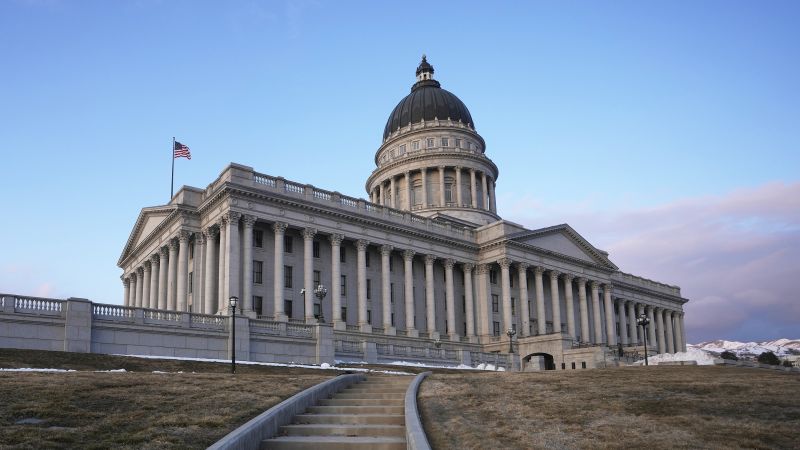I feel like I’ve seen this idea somewhere before, and as I recall, it did not work out well.
In Utah, with a Republican supermajority, the bill was introduced at the start of 2024 and passed in the House by a 57-14 vote and in the Senate by a 24-5 vote.
Ya don’t say. Well Utah, the good news is this is the least of your worries. You’ll figure out the rest before long though. Enjoy the basket ride to hell.
At least it’s a short ride, with how close they are already.
Who had Mormon mercs declaring war on the United States on their bingo card?
Damn it, the polygamy people are gonna start moving back East aren’t they…?
They already are, they think Missouri is the location where Jesus will come back to.
So it’s just him doing their own version of the sanctuary city thing?
Yes.
These laws are not new. Almost every state has some law on the books that directs state authorities to refuse to assist federal authorities under certain circumstances. In California and Colorado, state, county and local police are not allowed to assist the federal government in the enforcement of marijuana laws. Many cities and even states have the same for immigration enforcement as you said. In Texas and Florida state, county and local police are not allowed to enforce federal gun laws or assist the federal government in doing so.
The way this is framed by CNN with the “supremacy clause” thing is disingenuous, it has been long established that state authorities do not have the power to block federal actions within the state but are not required to assist them or enforce their laws. The supremacy clause exists to prevent States from violating treaties that the federal government has signed, infringing on enumerated powers of the federal government (such as the power to regulate cross border commerce and movement), and directly violating constitutional federal laws that apply to the States directly. The only way this Utah legislation differs from all these other state laws regarding marijuana, migrant asylum or gun regulstion is that they’re not specific to any set of Utah laws that conflict with federal law, it’s basically an open ended “the state can direct state and local authorities at any time not to assist the feds for any reason.”
Eh, there are limits. Utah has a pile of petty claims against the federal government including delusionally contesting ownership of federal lands. There’s a difference between having a narrow policy limiting the degree of law enforcement cooperation on one or two matters, and Utah passing a law that says “if we disagree with the feds on literally anything we can refuse to cooperate with them any time we feel like.” One is a matter of policy and discretion, the other actively flaunts federal supremacy. Utah doesn’t just get to decide it owns the national parks inside its state borders and order its employees to treat National Parks Service workers as trespassers, but it sure seems like this law is carefully crafted to create situations like that.
This is also hot on the heels of Utah also passing another bill that flaunts federal policy as regards separation of church and state. They really want to pretend they never joined the Union or like there’s never been a conflict between states and the federal government before and like this is somehow new territory.
Like the lawyer in the article said, this is what we’d call a whacko interpretation of how the Supremacy Clause works and is likely meant to appeal to the voters more than anything else.
There is a difference between refusing to enforce federal laws and declaring your ability to personally flout them and between actions that expand individuals rights and those that contract them. The fed may continue to enforce the law and you aren’t setting up a show down between state and federal governments whereby enforcement shall ultimately place the two in direct conflict.
I don’t know why they have to do an entire new thing - just cite the 10th amendment and get SCOTUS on your side and you can overrule the feds on anything.
Unless you’re using the 10th to cite Privacy…
This is the best summary I could come up with:
With the bill, Utah joins a long-standing small-c conservative push to promote states’ rights, particularly when the federal government is controlled by the opposing party.
Sandall said he modeled Utah’s Sovereignty Act on a 2022 bill out of Alberta, Canada, similarly pushing back on what they saw as federal overreach.
In particular, he mentioned a dispute with the Environmental Protection Agency’s “good neighbor” rule, a regulation to cut down on smog and air pollution crossing state lines.
Utah has also been in a fight with the federal government over control of public lands regarding three national monuments, namely Bears Ears, Grand Staircase-Escalante, and Northeast Canyons and Seamounts Marine.
And as a heavily Republican state, the legislature has taken up national partisan positions, such as opposition to Diversity, Equity and Inclusion programs.
If the legislature actually passes a concurrent resolution and overrules a federal regulation, then it will likely be overturned due to the Supremacy Clause, he predicted.
The original article contains 917 words, the summary contains 157 words. Saved 83%. I’m a bot and I’m open source!



